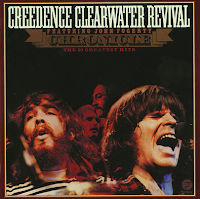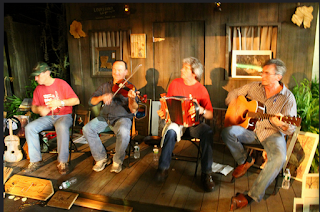Swamp Pop is a popular music genre shaped by the indigenous people of South Louisiana (the Acadian region) and the adjacent part of South East Texas. The swamp-pop ancestors were the Cajuns, who experimented with sound in the 1950s - early 1960s; the genre itself combines a new Orleans rhythm and blues country and traditional musical currents of French Louisiana. Although swamp-pop is a rather vague term, the genre has a large audience in its native regions, South Louisiana and southeastern Texas, this musical direction is also quite popular in the United Kingdom, Northern Europe and Japan.
Swamp rock is an independent musical genre, differs from swamp-pop more focus on rock music of the 1960s, rather than rhythm-and-blues of the 1950s, which became one of the determining factors in the sound of swamp-pop. This genre was recorded by such artists as Creedence Clearwater Revival, Tony Joe White, Delaney & Bonnie, and Jesse Ed Davis.
During the heyday of the genre (1958-1964) several Swamp pop songs were noted in the national US charts. Among them were: “Just A Dream” by Jimmy Clanton (1958), “Prisoner's Song” by Warren Storm (1958), “Sea Of Love” by Phil Phillips (1959), “This Should Go On Forever” by Rod Bernard (1959), Joe Barry "I'm A Fool To Care" (1960) and "I'm Leaving It Up To You" Dale & Grace (1963).
Swamp pop fans in south Louisiana and southeast Texas believed many of the songs of this genre, which never became national hits, classics. Among many others, these include “Lonely Days, Lonely Nights” by Johnny Allan (1958), “Crazy Baby” by Buck Rogers (1959), “Let's Do the Cajun Twis” by Randy and the Rockets (1962), “I'm Not a Fool Anymore by T. Halina (1963) and Clint West (1965) Big Blue Diamond.
 The musicians who influenced the formation of the somp-pop listened to (and played) traditional Cajun and Zeydeco music, as well as popular compositions of country and hillbilli - such musicians as Bob Wills, Mun Mullikan and Hank Williams. However, like other American youths in the mid-1950s, they soon discovered rock-n-roll and rhythm-and-blues sound - fashionable genres are rapidly gaining popularity in the performance of artists like Elvis Presley and Fats Domino. As a result, early swamp-pop musical preferences shifted from traditional French Louisiana folk songs such as Jolie Blonde, Allons a Lafayette and Les flammes d'enfer to rock and roll and rhythm and blues songs in English. In addition, the musicians switched from folk instruments, such as accordion and violin, to more modern instruments - electric guitars and bass guitars, a piano, a saxophone and full-length drum sets.
The musicians who influenced the formation of the somp-pop listened to (and played) traditional Cajun and Zeydeco music, as well as popular compositions of country and hillbilli - such musicians as Bob Wills, Mun Mullikan and Hank Williams. However, like other American youths in the mid-1950s, they soon discovered rock-n-roll and rhythm-and-blues sound - fashionable genres are rapidly gaining popularity in the performance of artists like Elvis Presley and Fats Domino. As a result, early swamp-pop musical preferences shifted from traditional French Louisiana folk songs such as Jolie Blonde, Allons a Lafayette and Les flammes d'enfer to rock and roll and rhythm and blues songs in English. In addition, the musicians switched from folk instruments, such as accordion and violin, to more modern instruments - electric guitars and bass guitars, a piano, a saxophone and full-length drum sets.
Swamp rock is an independent musical genre, differs from swamp-pop more focus on rock music of the 1960s, rather than rhythm-and-blues of the 1950s, which became one of the determining factors in the sound of swamp-pop. This genre was recorded by such artists as Creedence Clearwater Revival, Tony Joe White, Delaney & Bonnie, and Jesse Ed Davis.
Sound
The structure of the swamp-pop sound is characterized by emotional texts about love, honky-tonk piano, wavy bass parts, powerful brass sections and strong rhythm-and-blues back-beats. Obvious examples of this concept are ballads such as "Mathilda" group Cookie and his Cupcakes (written in 1958) is considered by many fans of the genre is the unofficial "anthem" of Swamp pop. The genre also recorded many optimistic compositions, such as “See You Later, Alligator” by Bobby Charles (1955), later rewritten by the group Bill Haley & His Comets.During the heyday of the genre (1958-1964) several Swamp pop songs were noted in the national US charts. Among them were: “Just A Dream” by Jimmy Clanton (1958), “Prisoner's Song” by Warren Storm (1958), “Sea Of Love” by Phil Phillips (1959), “This Should Go On Forever” by Rod Bernard (1959), Joe Barry "I'm A Fool To Care" (1960) and "I'm Leaving It Up To You" Dale & Grace (1963).
Swamp pop fans in south Louisiana and southeast Texas believed many of the songs of this genre, which never became national hits, classics. Among many others, these include “Lonely Days, Lonely Nights” by Johnny Allan (1958), “Crazy Baby” by Buck Rogers (1959), “Let's Do the Cajun Twis” by Randy and the Rockets (1962), “I'm Not a Fool Anymore by T. Halina (1963) and Clint West (1965) Big Blue Diamond.
Origins
 The musicians who influenced the formation of the somp-pop listened to (and played) traditional Cajun and Zeydeco music, as well as popular compositions of country and hillbilli - such musicians as Bob Wills, Mun Mullikan and Hank Williams. However, like other American youths in the mid-1950s, they soon discovered rock-n-roll and rhythm-and-blues sound - fashionable genres are rapidly gaining popularity in the performance of artists like Elvis Presley and Fats Domino. As a result, early swamp-pop musical preferences shifted from traditional French Louisiana folk songs such as Jolie Blonde, Allons a Lafayette and Les flammes d'enfer to rock and roll and rhythm and blues songs in English. In addition, the musicians switched from folk instruments, such as accordion and violin, to more modern instruments - electric guitars and bass guitars, a piano, a saxophone and full-length drum sets.
The musicians who influenced the formation of the somp-pop listened to (and played) traditional Cajun and Zeydeco music, as well as popular compositions of country and hillbilli - such musicians as Bob Wills, Mun Mullikan and Hank Williams. However, like other American youths in the mid-1950s, they soon discovered rock-n-roll and rhythm-and-blues sound - fashionable genres are rapidly gaining popularity in the performance of artists like Elvis Presley and Fats Domino. As a result, early swamp-pop musical preferences shifted from traditional French Louisiana folk songs such as Jolie Blonde, Allons a Lafayette and Les flammes d'enfer to rock and roll and rhythm and blues songs in English. In addition, the musicians switched from folk instruments, such as accordion and violin, to more modern instruments - electric guitars and bass guitars, a piano, a saxophone and full-length drum sets.
By the end of the 1950s, swamp-pop musicians formed their own sound and repertoire. They performed in local dance halls such as the Southern Club in Opelousas, Landry’s Palladium in Lafayette, the OST Club in the Rhine and the Green Lantern in Loutelle. In addition, they released records on local labels such as Jin Records by Floyd Soilo (Will-Platt), Goldband Records Eddie Schuler (Lake Charles), La Louisianne Records Carol Rachu (Lafayette), Crazy Cajun Records Hughie Mo (Houston), as well as labels owned by JD Miller from Crowley, Louisiana (who also recorded swamp-pop music for major national labels such as Excello Records from Nashville).
Swamp-pop musicians often used Anglo-American pseudonyms to hide their Cajun surnames. So, John Allen Guillot became Johnny Allan, Charles Robert Guidry - Bobby Charles, Joe Barrios - Joe Barry, Elwood Dugue - Bobby Page, and Terry Jean Deruan - Jean Terry. Some of these musicians changed their names because they were ashamed of their rural French roots — a feeling that at the time was part of the Cajuns. Others were due to economic gains: they wanted to sell records not only in South Louisiana and southeastern Texas, but also outside of these regions, where the pronunciation of ethnic Cajun surnames, such as Guillaume, Barrios, and Deruan, was unusual and unmemorable for promoters DJs and audiences.
Despite the obvious influences of rock and roll and rhythm and blues, swamp-pop was not devoid of folklore features. For example, Bobby Page and the Riff Raffs recorded “Hippy-Ti-Yo,” a bilingual rock-and-roll version of the traditional Cajun song “Hip et Taiaut,” and Rod Bernard did the same with “Allons danser Colinda,” another important francophone folk composition. In turn, Joe Barry subsequently re-recorded his hit “I'm A Fool To Care” in French under the name “Je suis belle pour t'aime”, and “Randy and the Roskets” released “Let's Do The Cajun Twist”, English remake of the French-beloved Allons a Lafayette.
Heritage
Since the appearance of the swamp-pop in the mid-1950s, more than 20 songs of this genre have been noted in the Billboard Hot 100 chart: five of them reached the Top-10, and three of them reached the Top of this charts. Despite the fact that it is New Orleans rhythm-and-blues that is considered one of the founders of the swamp-pop, later this genre also experienced the opposite effect, which is noticeable in the songs: “Just Because” by Lloyd Pryce, “Those Lonely Lonely Nights” by Earl King , "Can't Believe You Want To Leave" by Little Richard, "(I Don't Know Why) But I Do" by Clarence Henry and "On Bended Knee" by Bobby Charles. Swamp-pop also left its mark on the related genre, known as “swamp-blues”, including the classic composition Slim Harpo's “Rainin' In My Heart”. Subsequently, a lot of songs in these genres quail American artist Jerry Lee Lewis: “Mathilda” and “Got you on my mind” of the Cookie and the Cupcakes groups, and also “Rainin 'In My Heart” by Harpo.
Swamp-pop's influence on popular music of the 20th century is traced in the songs of The Rolling Stones “You'll Lose a Good Thing” and “Oh Baby (We Got A Good Thing Goin)” (a cover version of Barbara Lynn), “Sea of Love” The Honeydrippers (cover version of Phil Phillips), Elvis Presley's Pledging My Love (cover version of Johnny Ace), and even Oh! Darling The Beatles.
Swamp-pop also left a mark on the musicians of techno, especially on the early recordings of this genre, such as “Before the Next Teardrop Falls” and “Wasted Days and Wasted Nights” by Freddie Fender (1975). The audience in South Louisiana and Southeast Texas generally perceives Fender as a full-fledged swamp-pop musician.
Swamp-rock is a separate genre, the sound of which largely reflects the influence of rock music of the 1960s, rather than the rhythm and blues of the 1950s, characteristic of swamp-pop. The material in this genre was recorded by artists such as Creedence Clearwater Revival and Tony Joe White.
Although in the mid-1960s, the popularity of the swamp-pop began to gradually decline, which was associated with the boom of the so-called "The British Invasion", the genre continues to attract loyal fans to festivals and clubs in South Louisiana and Southeast Texas. Several young musicians, such as Don Rich, have succeeded the generation of swamp-pop pioneers, the majority of whom are now over sixty. Some young performers who are not related to this genre, such as Zachary Richard, Mark Broussard and C.C. Adcock, noted the strong influence of the somp-pop on their work (for example, Adcock co-produced the
documentary “Promised Land: A Swamp Pop Journey” about his sompom pop group Lil 'Band o' Gold, in which also the pioneers of the genre - Warren Storm and Tommy MacLaine).



No comments:
Post a Comment